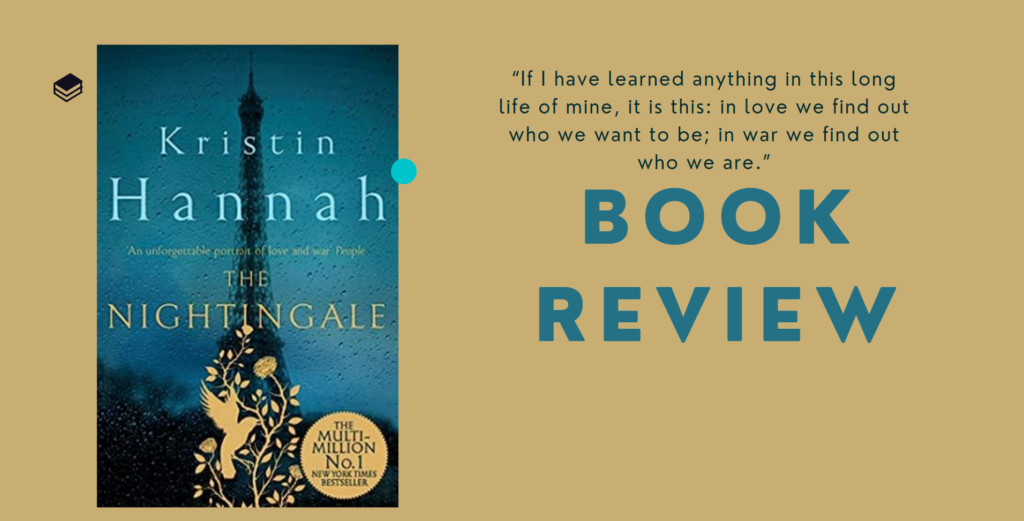
Rating: 4/5
Author: Kristin Hannah
Genre: Historical Fiction
Pages: 440
The more I read about world history, the more mysterious and elusive it becomes. History has multiple versions based on the biases of the authors. I have never been sure about how much to depend on one version over another. So I think, after a point, all one can do is accept everything with a pinch of salt and take a neutral standpoint to look at the past. IMO, it is one of the better ways. Because haven’t strong opinions and conviction proven pernicious in the past?
I had been hoping to read The Nightingale for a long time. Apart from its raving reviews everywhere, I knew it had female protagonists. The only thing I was worried about was getting too emotional esp. now in the middle of the pandemic, which some people anticipate is biological warfare happening undercover. But how long can one stay away once one’s mind is set on something? And so, I took the plunge into this best-selling book.
The Nightingale: Book Review
There are two parts to my review of The Nightingale.
Part One
Kristin Hannah is a prolific and seasoned author. She understands the nitty-gritty of good writing and the art of hooking the readers to the book. Her books are intense and never fail to arouse emotions in the readers.
The Nightingale is no different. The story is centered around the lives of two sisters during the German occupation of France in the early 1940s. As they go through the trials and tribulations amidst the war, one gets immersed in the story. The lives and circumstances of Vianne and Isabelle are very different. The people they are and the choices they make are at most times the stark opposite. And yet, you won’t root for one more or less than the other. The characters are not idealistic. They have been treated as real humans in the way they make bad choices, don’t take a stand when they need to, and have regrets.
The story is paced well and keeps the reader very much interested in the development taking place in the lives of two women. The story is the best part of the book. The book is bulky and has every element to get the reader stay interested. There is suspense, romance, turns and twists, and a play of emotions. The writing is quite plain and descriptive that you can easily create imageries in mind. The story never gets boring and stays eventful till the end. If one doesn’t go too deep into the technicalities, the story traps you into its small nuances that stay very real at one end, and at the other, excite you.
I thoroughly enjoyed reading The Nightingale from the point of view of a work of fiction. There are relatable heroines, a despicable villain, a strong plotline, and quite a few catches and hooks.
Part Two
Kristin Hannah has painted the Nazis evil. She has left no stone unturned to induce negative emotions, even hatred, against Hitler’s regime. In the smallest of incidents, she has painted the Nazis wicked and vile. And rightly so, isn’t it?
The problem that I have with this is her blatant political statement. Holocaust was gruesome. But for something as delicate as this, I expect responsible writing. Holocaust isn’t the only crime ever committed against the masses. Countries and their leaders have systematically and covertly committed crimes against their citizens, let alone people of other countries, and they have never been so much as frowned upon, let alone hated. And here I am not talking about the popular communist regimes.
Writing historical fiction is a great responsibility. People expect to see the past as-is, through the eyes of fictional characters. I don’t think it is fair to paint the past dishonestly or with agenda. There are always shades of grey. Most of the West European countries, including France and the United Kingdom, took colonies where they usurped what didn’t belong to them and turned the natives of the land into slaves. How many people know about the Jallianwala Bagh incident? British colonized India and looted its wealth over the years, so pardon me if I have problems with looking at their “courageous” contributions with any rosy lenses.
War and Peace are all a matter of diplomacy and politics. Making heroes and villains is easy, but picking out the grey areas and sharing blame without undue biases is not easy.
All I am willing to say is, in books based on true events, taking the plotline to extremity only creates resentment and cynicism. I understand that this book is for entertainment purposes, but the history that this book holds impacted millions of lives and should not be taken casually. Instead of inciting emotions of pain and hatred, the author should have opened a way for critical thinking using a balanced tone. Responsible writing, please.
Happy Reading. Chao!
To meet other interesting books listed genre-wise, check out the Book Shelf.
